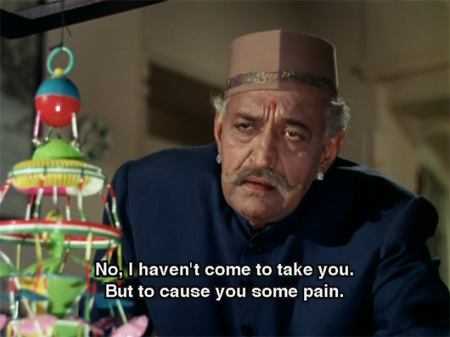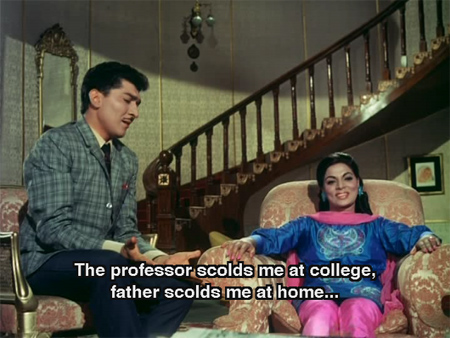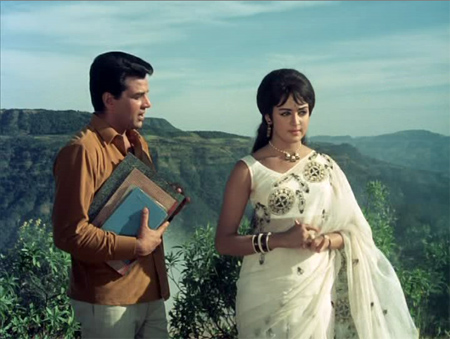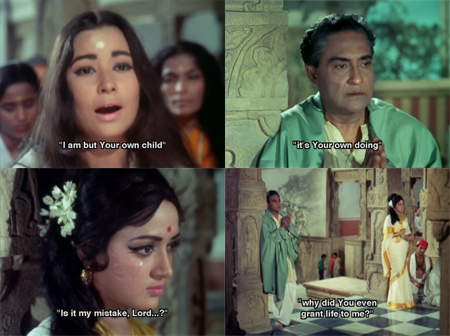When a movie opens with yet another poor woman forced to give up her husband for the sake of his family’s honor and material wealth, leaving her and their baby nothing to fall back on but prostitution, I usually think: Oh No No No No.
But I love this film. It’s one I can watch over and over just for the beauty of Dharmendra alone. He is at his best around this time in my opinion, and it is one of his first films with a very young and pretty Hema Malini. But beyond that, it has a good, nicely-paced script (punctuated though it is with a completely superfluous and tiresome CSP) which culminates in a satisfyingly emotional way (in other words, I cried); although I must confess to some ambivalence about the overall message (more on that towards the end). Plus: absolutely lovely songs by Laxmikant Pyarelal and lots of dancing from Hema!
The story begins, as I said above, with a woman of insufficient means and no family connections being “persuaded” by a wealthy man into giving up her claim on his son. She and the son have been informally married, and have a baby daughter; but naturally this minor inconvenience is swept under the carpet and she eventually caves under pressure.
Twenty years later we meet Rajesh (Dharmendra), a young man whose parents have died leaving him in the care of Jagad Babu (Ashok Kumar). He is completing his Ph.D. under the proud eyes of Jagad and his daughter Rekha (Sonia Sahni)—who is in love with Rajesh (well, what sane woman wouldn’t be?). Rekha is also being wooed (albeit incompetently) by an engineer named Arun (Roopesh Kumar).
One quibble I have with this film is that the Arun-Rekha relationship wasn’t given enough development—they were quite cute together with Rekha’s sophistication contrasted to sweet Arun’s goofiness. If only they had been given the screen time wasted on the Comic Side Plot!
Jagad sends Rajesh off to finish his thesis at an unspecified hill station, where he follows the sound of someone singing one day and meets an unhappy, mysterious beauty. He tries to engage her in conversation, but she brushes him off.
He finishes his Ph.D. and is given a lectureship and made the guardian of a boys’ hostel at the university. Some of the boys are a bad lot, led into mischief by the nephew (Mohan Choti) of an influential man. Rajesh finds their beds empty one night at lights-out, and discovers that they are frequenting a local brothel where a dancer named Chandabai (Hema Malini) performs.
He’s momentarily startled to see the same mystery woman he had met while finishing his thesis.
Nice! She treats him with cool politeness and he asks her to refuse entry to his students. I love this scene because every condescending and judgmental thing Rajesh says is met with a shrewd response from Chanda—she’s not taking his attitude lying down (so to speak). For instance, her response to his statement above is: “As long as men like you keep coming here, you will find women like me.”
She surprises him by agreeing to bar the boys from her place on one condition: that he come there every day to give her the education he’s dispensing in his classroom. After he leaves, Kesaribai (the old woman who runs the kotha) questions Chanda about her request and it’s evident that he has hurt her feelings and made her angry.
They have each made judgments about the other, but in the intervening weeks they discover how wrong they were. Chanda is the first to be surprised by Rajesh’s real goodness—it’s not a facade. Her unsubtly seductive advances towards him are met with disapproval and rejected. Finally convinced that Rajesh means to actually try and teach her, Chanda shows him her true self—the unhappy girl he had met on the hillside, not the cynical tawaif. She is educated and longs to lead a respectable life.
As they edge closer to each other, Jagad Babu drops a bombshell on Rajesh (that the rest of us had seen coming a mile away): he wants Rajesh to marry Rekha.
Chanda meanwhile decides to give up dancing and tells Kesaribai to shut down the brothel. She also explains to Rajesh (via a flashback) how it came to pass that she has been dancing there.
Her mother had kept the promise she had given to Chanda’s grandfather, that she would not reveal Chanda’s father’s identity to her. But on her deathbed she had asked Kesaribai to take Chanda to her father. Kesaribai instead has forced Chanda into working at the brothel by dangling the hope of a reunion with her father in front of her, but continues to refuse to reveal his name. Chanda had been about to give up hope when Rajesh entered her life.
She shows Rajesh a ring that her mother had given her belonging to her father, and Rajesh recognizes Jagad Babu’s family insignia. Later, he describes her situation to Jagad Babu in an effort to gauge his reaction. Jagad initially tells Rajesh that the father should welcome her, but when Rajesh shows Jagad his own ring as a final test, Jagad realizes who she is and changes his tune.
Rajesh, disappointed in his mentor, is now on the horns of a dilemma. Jagad Babu has been nominated to run for upcoming elections to the Lok Sabha and a scandal will probably ruin his chances, but of course Chanda deserves to know who her father is. For the time being, Rajesh’s loyalties stay with Jagad and he keeps silent. To be fair, Jagad is visibly troubled as well. He visits the temple to find some solace, where Chanda has gone for the same reason.
We are treated to a beautiful bhajan: “Jeevandaata Jagat Pita Tum” (with a guest appearance by Indrani Mukherjee). When it ends, Jagad Babu strikes up a conversation with Chanda, not knowing that she is his daughter. They are interrupted by Rekha, who has come to the temple with Rajesh. Jagad teases his daughter about leaving Rajesh behind her in her rush.
Poor Chanda! And so much for solace. She flees past Rajesh who looks after her, worried.
Things are about to escalate! When Rajesh goes to see Chanda later, his badmash students see him going into the kotha and grab at an opportunity for revenge (they are angry about being refused entry to Chanda’s performances).
Inside, Chanda is dancing for customers again. Her heart broken and dreams dashed, she has decided to give way to fate.
And really, what can Rajesh do or say? He’s engaged to Rekha, and at this point has also promised Jagad Babu’s housekeeper (who brought him up) that he will never betray Jagad’s secret. Jagad himself—bent on a political career—has indicated that he wants nothing to do with Chanda.
Can anything about this mess possibly turn out right? Will Rajesh lose his job? Can he ever go against the man who has treated him as his own son? Does Chanda have any hope of a respectable life? You’ll have to watch Sharafat to find out. It’s highly entertaining, and though I was bothered by elements of the film (that dancing girls are immoral, and women should be pure as the driven snow) at least the message was there that men need to step up and take responsibility for their “immoral” actions as well. But the fact that I even say that irritates me too: should I applaud a film for stating something which should be obvious?
Oh Hindi cinema, how you confuse me sometimes. But, I just can’t help myself. I love the music in this, Dharmendra and Hema’s chemistry, and the romantic and emotional drama of the story. And as intrusive as the CSP is, at least eventually it includes the Goodness of Tun Tun (although the constant fat-ugly jokes at her expense also cause me moral confusion):
But then again, there’s this:

















